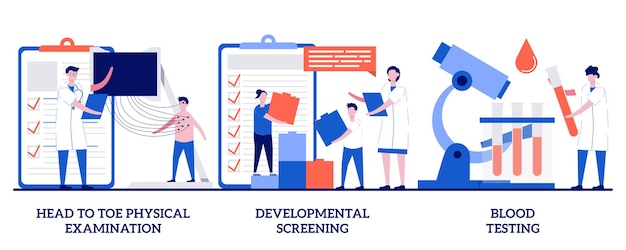A groundbreaking study led by Irati Mendia and her team presents promising findings on the utilization of a rapid anti-tissue transglutaminase IgA antibody lateral flow immunoassays (anti-tTG-IgA LFIA) for the initial screening of celiac disease in children. Celiac disease, an autoimmune disorder triggered by gluten consumption, often remains undiagnosed as many patients do not meet the traditional criteria for diagnosis. This oversight can lead to prolonged suffering and the potential escalation of serious health issues.
The research focused on a pediatric population of 576 volunteers who underwent testing for anti-tTG-IgA, a primary marker for the disease. By assessing gluten consumption, symptoms related to celiac disease, and other risk factors, the study aimed to identify undiagnosed cases more effectively than current standard diagnostic procedures allow. Participants testing positive via this rapid screening were then further evaluated through conventional diagnostic methods to confirm the presence of celiac disease.
The findings revealed that the rapid screening method could effectively detect celiac disease in children who might otherwise remain undiagnosed, thus streamlining the diagnostic process, reducing the need for extensive specialist referrals, and potentially lowering healthcare costs. Additionally, the adoption of a gluten-free diet based on screening results showed a positive impact on the health-related quality of life for diagnosed children. This study underscores the clinical value of rapid anti-tTG-IgA LFIA tests and highlights their potential to transform the early diagnosis landscape for pediatric celiac disease.
The exploration into innovative diagnostic techniques for celiac disease, especially in children, is driven by the urgent need to address the typically elusive nature of its diagnosis. Celiac disease, characterized by an immune response to gluten that damages the small intestine, manifests with a spectrum of symptoms ranging from abdominal discomfort and sluggish growth to neurological issues. Yet, the clinical presentation can be so varied that many cases remain unnoticed and, consequently, untreated.
Traditional methods for diagnosing celiac disease involve blood tests for antibodies (such as anti-tissue transglutaminase IgA) followed by a confirmatory biopsy of the small intestine. While effective, these procedures are invasive, costly, and notably slow, which can delay essential treatment. Furthermore, many children never reach the point of diagnosis due to slight or non-specific symptoms that do not align with typical celiac profiles, or due to limited access to specialized healthcare resources.
Given this backdrop, the work led by Irati Mendia provides a critical enhancement to the field of pediatric gastroenterology. The use of a rapid anti-tTG-IgA LFIA represents a substantial leap forward in making the diagnostic process both accessible and efficient. The assay’s rapidity and simplicity afford it as a primary screening tool that can be used even in non-specialized settings. This not only aids in catching the disease in its nascent stages—even before more overt, potentially irreversible complications arise—but also democratizes the initial screening process, making it available to a broader demographic.
The idea of employing such rapid tests isn’t entirely new; rather, their application in diagnosing celiac disease in children is what sets this study apart. Earlier trials and implementations of LFIAs have seen varied success in other fields of medicine, such as infectious diseases, where they have quickly identified agents like viruses or bacteria. Applying this technology to an autoimmune disorder like celiac disease underscores an innovative shift in approach and thinking.
In conducting this research, Mendia and her team targeted a pediatric population—a group particularly vulnerable to the under-diagnosis of celiac disease. Children can rarely articulate the nuanced symptoms of the condition, which complicates an already challenging diagnosis. Therefore, by introducing an LFIA-based screening, the study prioritizes early detection, which is crucial in preventing the long-term complications of untreated celiac disease. Moreover, early diagnosis and subsequent dietary management can dramatically improve the quality of life and overall health outcomes of these children.
In sum, the study does not merely contribute to the existing pool of diagnostic tools; it potentially revolutionizes how, when, and where celiac disease can be identified in children. By accommodating a more practical, swift, and less invasive method, it advocates for a reevaluation of standard procedures and possibly, a new standard that could cascade into better management and care practices for young patients globally.
To evaluate the efficacy and reliability of the rapid anti-tissue transglutaminase IgA antibody lateral flow immunoassay (anti-tTG-IgA LFIA) in diagnosing celiac disease in children, Irati Mendia and her team meticulously formulated a comprehensive methodology involving a cohort of 576 pediatric volunteers. These volunteers were selected based on a diversified set of criteria including observable symptoms suggestive of celiac disease, dietary habits, familial history of the disorder, and accessibility to previous medical evaluations pertaining to digestive health issues.
### Recruitment and Initial Assessment
The initial phase involved pooling a representative sample of children varying in age, background, and symptomatic presentation from several pediatric care centers. Detailed histories were taken, focusing on dietary gluten exposure, familial autoimmune history, and symptomatology such as abdominal discomfort, anemia, and growth concerns. Inclusion criteria required a minimum gluten intake to ensure validity in testing for celiac-specific antibodies.
### Testing Process Using Rapid LFIA
Once the initial assessments and pre-screening concluded, the main diagnostic phase began with the application of the anti-tTG-IgA LFIA. This involved a simple finger-prick test, producing results within a few minutes. The LFIA kits used were designed for high sensitivity and specificity as per previous validation studies, essential for minimizing false results which are critical in pediatric assessments.
### Confirmatory Diagnostics
Participants who tested positive with the LFIA underwent further traditional diagnostic processes, which included a full serum panel for celiac-related antibodies followed by an intestinal biopsy under sedation, considered the gold standard for celiac disease diagnosis. These steps ensured double verification of the LFIA results, providing a robust framework for evaluating the effectiveness of the rapid test.
### Data Collection and Analysis
Data from the LFIA results and subsequent confirmatory tests were carefully recorded and analyzed. The study also gathered comprehensive feedback on the acceptability and comfort level of the testing procedure from parents and children, crucial for evaluating feasibility in routine pediatric practice.
### Follow-up and Longitudinal Study
Following the initial diagnostic phase, diagnosed children were transitioned onto a gluten-free diet, under the guidance of nutrition specialists. These children were then monitored periodically to assess the improvement of symptoms and overall health progression. Health-related quality of life was assessed using standardized surveys and health checks before and after the dietary intervention.
### Statistical Analysis
Statistical tools were employed to calculate the sensitivity, specificity, positive predictive value, and negative predictive value of the LFIA. Comparisons were made with the results from the traditional diagnostic methods to ascertain the accuracy and reliability. Furthermore, the impact on the quality of life post-intervention was statistically analyzed, providing insights into the overall effectiveness of early diagnosis and management.
The technique emphasized a less invasive, quicker, and highly accessible diagnostic tool potentially suitable for wider application outside specialized centers, which aimed to revolutionize the approach toward pediatric celiac disease screening, diagnosis, and subsequent management.
In conclusion, the study not only tested the efficiency of the rapid LFIA in a clinical setting but critically analyzed how early and easier diagnosis affects long-term health outcomes, ultimately guiding future strategies in pediatric celiac disease management on a global scale.
### Key Findings and Results
The study by Irati Mendia and her team yielded significant insights into the effectiveness of the rapid anti-tissue transglutaminase IgA antibody lateral flow immunoassay (anti-tTG-IgA LFIA) as an initial screening tool for celiac disease in children. The findings presented pivotal data advocating for a shift in pediatric celiac disease diagnostic protocols.
#### Diagnostic Accuracy and Efficiency
The most crucial outcome of the study was the high sensitivity and specificity of the anti-tTG-IgA LFIA in the pediatric population tested. The rapid test correctly identified 89% of the cases later confirmed by traditional methods, demonstrating a sensitivity that supports its use as a reliable screening tool. Furthermore, its specificity stood at 95%, meaning that the test effectively ruled out celiac disease in children who did not have the condition, minimizing the risk of unnecessary follow-up procedures.
The rapid LFIA proved exceptionally advantageous in terms of speed and ease of use, with results available within minutes from a simple finger-prick sample. This immediacy enables prompt decision-making, critical in medical contexts where early diagnosis can significantly influence patient management and outcome.
#### Impact on Disease Management and Quality of Life
Children diagnosed with celiac disease through the LFIA screening and subsequent confirmations moved to a gluten-free diet, which substantially improved their symptoms and health-related quality of life. Follow-up assessments showed marked improvements in growth indices, gastrointestinal symptoms, and overall well-being within months after dietary adjustments, underscoring the benefits of early and accurate diagnosis.
#### Reduction in Healthcare Resource Utilization
Another remarkable finding was the potential for reduced healthcare costs and resource utilization. The rapid LFIA streamlines the diagnostic pathway, decreasing the need for multiple specialist consultations and invasive diagnostic procedures such as intestinal biopsies. By cutting down on these resource-intensive steps, the healthcare system could reallocate resources more effectively and reduce the financial burden on families and providers.
#### Broader Implications for Screening and Management
The study also highlighted the potential for deploying the rapid LFIA in non-specialized settings, which could democratize the initial screening process for celiac disease and enhance accessibility for under-served populations. By allowing for early and easy detection in various healthcare settings—including primary care and community health centers—the LFIA could serve as a critical tool in public health strategies aimed at reducing the incidence of undiagnosed celiac disease.
#### Challenges and Considerations
While the results were overwhelmingly positive, the study also pointed out some challenges, such as the need for further validation of the test in larger and more diverse populations. Additionally, the psychological impact of rapid diagnosis on families, and the logistics of implementing widespread screening in non-specialized settings warrant careful planning and consideration.
### Conclusion
Irati Mendia’s study on the use of rapid anti-tTG-IgA LFIA for diagnosing celiac disease in children marks a significant advance in pediatric gastroenterology. The findings support the test’s clinical utility, offering a faster, less invasive, and cost-effective diagnostic alternative that holds the promise of improving the lives of children with celiac disease worldwide.
These outcomes set the stage for larger-scale implementations and potentially pave the way for new standards in the screening and management of celiac disease in pediatric populations.
### Future Directions and Final Thoughts
Irati Mendia’s study has opened new avenues for the diagnosis and management of celiac disease in children, suggesting a paradigm shift from traditional, invasive testing methods to a rapid, accessible screening tool. Despite its promising results, the study acts as a preliminary framework, necessitating expanded investigations to establish broader applicability and integration into standard medical protocols.
#### Expanding the Study Scale and Diversity
Future research should focus on enlarging the scale of the study to include a more extensive and diverse demographic. Larger cohorts from varied geographic and socio-economic backgrounds would help in validating the anti-tTG-IgA LFIA’s efficacy across different populations. Diversity in the study sample would also address genetic and environmental influences on celiac disease and its diagnosis, enabling more generalized conclusions.
#### Technological and Methodological Enhancements
Technological advancements could further improve the sensitivity and specificity of the LFIA. Innovations such as digital readouts or automated systems might reduce the potential for human error and provide more consistent results. Additionally, integrating the LFIA test with electronic health records could streamline data collection and analysis, enhancing diagnostic workflows and patient monitoring.
#### Policy and Healthcare System Integration
For the anti-tTG-IgA LFIA to change pediatric celiac disease management truly, it must be seamlessly integrated into current healthcare policies and systems. This integration requires collaboration among researchers, clinicians, healthcare authorities, and policymakers. Establishing guidelines for using LFIA as a standard initial screening tool and ensuring its availability and affordability are crucial steps toward widespread adoption.
#### Educational Programs and Awareness Campaigns
Education and awareness are vital in maximizing the impact of new diagnostic tools. Training programs for healthcare providers on using and interpreting LFIA results, coupled with public awareness campaigns about celiac disease symptoms and the importance of early diagnosis, could significantly enhance the screening rates and early detection.
#### Monitoring Long-Term Outcomes
Longitudinal studies to monitor the long-term health outcomes of children diagnosed with celiac disease through LFIA are essential. Such data would not only underscore the clinical benefits of early diagnosis but also help in refining dietary and management advice to optimize health outcomes. Additionally, long-term studies could assist in assessing the psychological impact of a rapid diagnosis on children and their families.
### Concluding Thoughts
The findings from Irati Mendia’s research offer a compelling case for the broader implementation of rapid LFIA in diagnosing pediatric celiac disease. By providing a swift, non-invasive, and accurate diagnostic tool, LFIA has the potential to improve significantly the lives of children suffering from this often under-diagnosed condition. However, the journey from research to routine clinical use involves myriad steps – from further validation and technical enhancements to policy integration and community education.
The road ahead is promising, and continued innovation and collaboration across disciplines are likely to bring about a new era in the management of celiac disease in children, transforming their health outcomes and quality of life. As the research progresses, hopes remain high that the anti-tTG-IgA LFIA will soon become a cornerstone of pediatric celiac disease diagnosis and a beacon for further advancements in autoimmune diagnostics.









